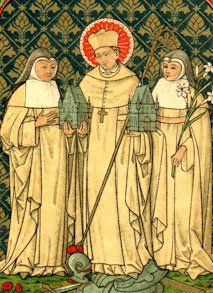For some reason, a 12th century Norman knight named Jocelin did not want his son to follow in his footsteps. We do not know why, but a common modern assumption is that Jocelin's son, Gilbert of Sempringham (c.1089-1190), had some physical deformity that would have made his career as a knight and warrior untenable. Whatever the case, Jocelin sent his son to study theology at the University of Paris.
Gilbert came back to England in 1120 and, after being given the parishes of Sempringham and Tirington, joined the household of the Bishop of Lincoln, Robert Bloet (who started as a clerk in the household of William the Conqueror and later became Chancellor).
He used his revenue from Tirington to aid the poor, and lived on the revenue from Sempringham. Robert Bloet's successor as Bishop of Lincoln ordained him a deacon, then as a priest after 1123, but when offered the archdeaconry of Lincoln he refused.
In 1130 his father died. Gilbert inherited his father's Lincolnshire manor and lands, and returned there. He did not, however, abandon the religious life. He now had the income to execute some grander plans. He decided to found his own monastic order.
The Gilbertines were originally composed of young men and women who had known and/or been taught by Gilbert in the parish school. It is the only monastic order founded in England. He used the Cistercians as his model, but when he appealed to the Cistercians themselves in later years for aid in maintaining and expanding the Gilbertines, he was rejected because of his inclusion of women.
Things turned sour for Gilbert in 1165, when he was imprisoned by King Henry II on the suspicion that he aided the fugitive Thomas Becket. He was eventually exonerated. Trouble found Gilbert again about 1180 when the lay brothers among the Gilbertines rose up because they were worked too hard (to enable the religious brothers to spend their days in prayer). The case was taken to Rome, but Pope Alexander III supported the 90-year-old Gilbert. Still, it is reported that living conditions for lay brothers improved afterward.
Gilbert, blind for the last few years of his life, resigned as head of the Gilbertines. He died in 1190 at the estimated age of 100+. His canonization did not take long: Pope Innocent III confirmed his sainthood in 1202, placing his Feast Day on 4 February, the day of his death, but it is now celebrated on 11 February.
